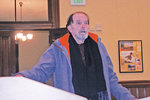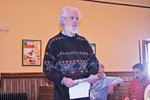The Port Townsend City Council is still considering when to schedule a special meeting to vote on a resolution declaring the city as either a “sanctuary” or a “welcoming” city.
An ad hoc …
This item is available in full to subscribers.
We have recently launched a new and improved website. To continue reading, you will need to either log into your subscriber account, or purchase a new subscription.
If you had an active account on our previous website, then you have an account here. Simply reset your password to regain access to your account.
If you did not have an account on our previous website, but are a current print subscriber, click here to set up your website account.
Otherwise, click here to view your options for subscribing.
* Having trouble? Call our circulation department at 360-385-2900, or email our support.
Please log in to continue |
|


The Port Townsend City Council is still considering when to schedule a special meeting to vote on a resolution declaring the city as either a “sanctuary” or a “welcoming” city.
An ad hoc committee met March 3 for a second and final meeting, which drew roughly 15 attendees and included people who offered critiques of the draft declaration.
Fred Nussbaum suggested that the declaration’s language extend to “residents and visitors,” while also noting that immigrants are statistically less likely to commit crimes.
Fellow returning attendee David Berrian conceded that immigrants do not currently qualify as a “protected class,” but then suggested that Port Townsend designate them as such.
Edwin Kraft and Richard Hahn were the voices of dissent, objecting on grounds of principle and pragmatism.
Kraft expressed sympathy with immigrants, noting the immigrant past of most American families, but he could not condone what he sees as a clear-cut example of breaking the law.
“I’ve lived in Latin American countries, and I loved the people there,” Kraft said. “They are as welcome as anyone to come here, but as legal residents. They’re not any better or worse than anyone else. I just want them to come here legally.”
Hahn expressed concerns over federal funding that could be lost to the city over its proposed stand, and called for a vote of the city’s residents, out of the conviction that “the silent majority is against this.”
BY THE LAW
City Council member David Faber, who served as the committee’s chair, reiterated that the declaration is being written with an eye toward abiding by federal law, while fellow council and committee member Michelle Sandoval noted that federal funds received by Port Townsend are actually given to, and dispensed by, the state of Washington through the state Department of Commerce.
City Manager David Timmons offered further reassurance that he has seen no plans to take back already awarded federal funds, before Faber clarified for Kraft that immigration violations defy civil statutes, “but that doesn’t make it a criminal offense.”
City Attorney Steven Gross reported that, as per the committee’s inquiries during its last meeting, the Jefferson County Jail does not hold inmates based on their immigration status, but the jail’s contract with the city contained too much ambiguity for Sandoval’s comfort.
“We should make this part of our contract with the jail,” Sandoval said. “I don’t want them making courtesy calls to ICE [Immigration and Customs Enforcement] or Border Patrol. Yes, we will obey federal criminal warrants, because we don’t want to break the law, but I don’t want us going out of our way to help the federal government on this.”
Rather than a confrontation with the county, however, Sandoval expressed the desire to meet with county officials on a more frequent basis to address such issues.
Although council and committee member Amy Howard suggested several categories of potentially disadvantaged people whom she wished to see explicitly identified and protected by the declaration, she admitted to sharing Faber’s fears that “even though our aims are inclusive, we might be exclusive by definition” by inadvertently leaving someone out.
And while Gross had no problems including non-protected classes of people in this list, he pointed out the limits of the city’s ability to enforce the protection of those classes.
Sandoval then questioned whether the term “sanctuary” should be used in the declaration at all.
“There is an amazing amount of confusion over what that term actually means,” Sandoval said. “People think we’re declaring an intent to break the law, like we’re raising a flag and we’ll suddenly be overrun.”
“The word itself has unfortunately become divisive,” Howard said.
“I wasn’t married to it,” Faber added. “We included the term because it was requested by the community.”
“If it was me alone, I’d keep it, but I worry that it might be misleading to some people,” Sandoval said.
SECOND RESOLUTION
Timmons repeatedly floated the idea of a second resolution, to address the expanding concerns of the committee and the citizens who voiced their support for a resolution. Sandoval and Howard agreed “there might need to be a sequel,” but they saw such a measure as more of a response to future actions by the federal government.
When the committee reopened the meeting to public comment near its end, Nussbaum returned to the podium to express his sympathy for the committee’s choice in naming the resolution.
“‘Sanctuary city’ might be too strong a term, but ‘welcoming city’ is probably not strong enough,” Nussbaum said.